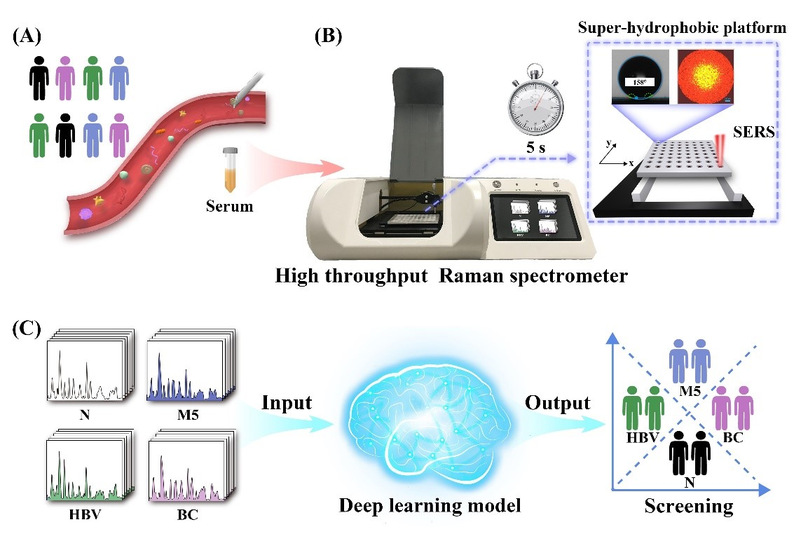Efficient early screening, essential for the prevention and diagnosis of such diseases as cancer, will greatly improve the survival rate of patients. In recent years, the ultrasensitive surface-enhanced Raman scattering (SERS) technology has shown great application potential in tumor detection. For example, the label-free SERS-based blood analysis has the advantages of being non-invasive, convenient and effective in overcoming tumor heterogeneity detection. However, there remains two drawbacks in practice: that in the process of sample preparation, the existence of coffee-ring effect makes SERS signals less repeatable and more fluctuant, which brings difficulties to the standardization of detection; and that in the process of SERS spectroscopic detection, the detection sites of samples need to be manually positioned in sequence, which is subjective and time-consuming, thus failing to meet the demand for high throughput and accurate detection of large multi-cancer samples, and hindering further clinical and translational application of SERS. To address the mentioned-above shortcomings, the research team developed a SERS spectroscopic detection platform with self-positioning and super-hydrophobic functions. Thanks to the specially designed super-hydrophobic circular arc groove array, the platform will not only overcome the coffee-ring effect to achieve automatic self-positioning of targets and high throughput detection, but also improve the detection sensitivity (detection limit: 10-12 M) and signal repeatability (relative standard deviation: 3.7%). The platform was used to analyze serum samples from breast cancer patients, leukemia patients, hepatitis B virus patients and healthy volunteers to obtain high-quality SERS spectra of the blood features from the four types of samples. Meanwhile, by using deep learning algorithm to obtain potential diagnostic information and build efficient diagnostic models, the platform can accurately identify (>80%) and classify the four types of samples. The establishment of this detection platform will facilitate efficient detection studies of large multi-group and multi-cancer samples, which is likely to be applied in clinical and translational research, providing new optical detection methods for early screening, progressive monitoring and prognostic assessment of tumors.
Entitled “High Throughput Blood Analysis Based on Deep Learning Algorithm and Self-Positioning Super-Hydrophobic SERS Platform for Non-Invasive Multi-Disease Screening”, the research results were published in Advanced Functional Materials (IF=18.808, Area One TOP), with FNU as the first organization, Doctoral student Lin Xueliang as the first author and Prof. Feng Shangyuan, Dr. Lin Duo and Prof. Song Jibin of Fuzhou University as the corresponding authors. This project was funded by the National Natural Science Foundation of China, the Fujian University Industry-University Cooperation Project, the “Baochen Program” High-end Talent Program of FNU and the Innovative Research Team Program of the Ministry of Education.

(Schematic diagram of self-positioning super-hydrophobic blood SERS platform for multi-disease high-throughput detection)
(Translated by Chen Yonghui/ Reviewed by Xie Xiujuan)
